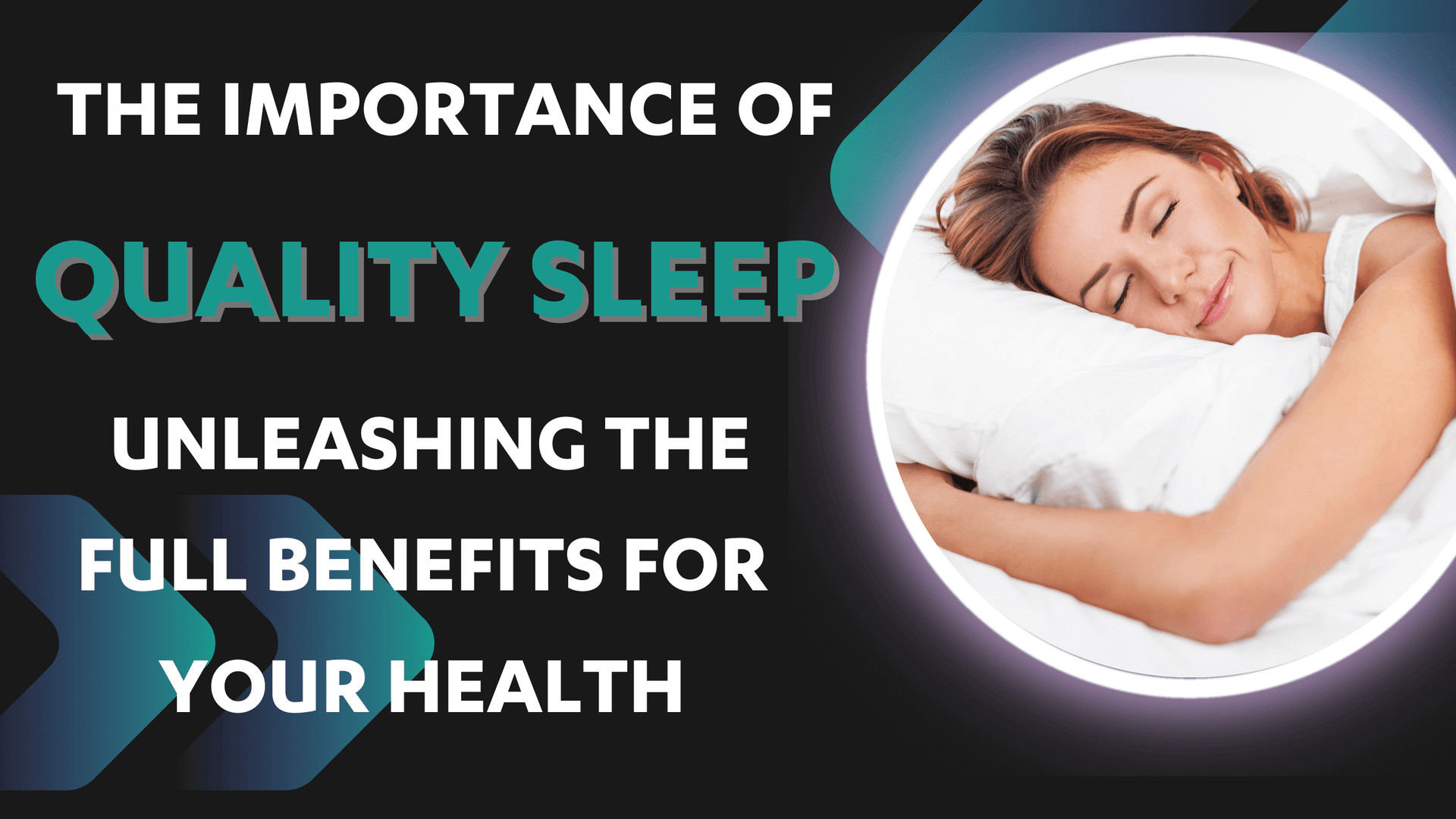
Importance of Quality Sleep: Unleash the Full Benefits for Your Health
In today's fast-paced world, sleep often takes a back seat to the demands of daily life. Yet, it is one of the most crucial aspects of our overall well-being. We actually spend approximately one-third of our lives sleeping, which speaks volumes about the importance of sleep in our lives. While it may seem like a passive activity, sleep is anything but unproductive. Quality sleep isn't just about feeling rested; it's a cornerstone of good health, impacting everything from our energy levels to our immune system, digestion, and even cognitive function. If you’re not prioritising your sleep, you’re missing out on a wealth of benefits that could transform your life. This blog will dive deep into the myriad health benefits that come from getting enough high-quality sleep, making a compelling case for why you should make it a top priority.
How Much Sleep Do We Really Need?
The amount of sleep we need varies by age, lifestyle, and individual needs, but most adults require between 7-9 hours of sleep per night to function optimally. However, it’s not just the quantity of sleep that matters—sleep quality is equally crucial. Sleep is composed of cycles that last around 90 minutes each, with each cycle containing several stages:

Light Sleep (Stages 1 and 2): This phase allows the body to relax and prepare for deeper stages of sleep. It constitutes about 50-60% of the sleep cycle.
Deep Sleep (Stages 3 and 4): This stage is where the body undergoes repair and regeneration. It’s essential for physical recovery, immune function, and overall health. Deep sleep constitutes approximately 20% of the sleep cycle.
REM Sleep (Rapid Eye Movement): REM sleep is critical for cognitive functions such as memory consolidation and emotional regulation. During REM, the brain processes the day’s information. This stage accounts for about 20-25% of the sleep cycle.
For the best results, it’s essential not only to get enough hours of sleep but also to progress through these stages uninterrupted. The deeper and more restful your sleep, the better equipped your body is to function at its peak.
The Role of Sleep in Energy Levels and Daily Functioning

One of the most immediate benefits of quality sleep is increased energy levels. When you sleep deeply, your body undergoes essential processes that restore energy. During the deep stages of sleep, your body repairs tissues, replenishes energy stores, and strengthens muscles. If you’re skimping on sleep, you’re likely to feel sluggish and unmotivated throughout the day, struggling to keep up with your daily tasks.
Furthermore, quality sleep ensures that your energy is sustained throughout the day. Unlike caffeine or sugar, which provide only temporary boosts, sleep gives you the natural energy you need to stay focused and productive.
Repair and Regeneration: Sleep as a Time for Healing
During sleep, especially deep sleep, your body enters a critical phase of repair and regeneration. This is the time when your body heals from the wear and tear of the day. Cellular repair occurs, tissues regenerate, and growth hormones are released, which are vital for repairing muscles and tissues.

For athletes or anyone involved in physical activity, quality sleep is especially important. It enhances physical recovery, helping you to bounce back faster from workouts and injuries. However, you don’t need to be an athlete to reap these benefits. The very act of daily living causes micro damage to our body that needs to be repaired on a regular basis, and sleep is the most productive time to achieve this. Everyone can experience improved physical health by ensuring they get enough deep sleep.
Strengthening the Immune System

Your immune system is another area that greatly benefits from quality sleep. During sleep, your body produces cytokines, which are proteins that help fight infection, inflammation, and stress. Lack of sleep can reduce the production of these protective cytokines, making you more susceptible to illness.
Inadequate sleep has been linked to a weakened immune response, meaning that you're more likely to catch a cold or the flu when you're sleep-deprived. On the flip side, when you prioritise sleep, you give your immune system the time it needs to recharge, making it more effective at fighting off pathogens.
Digestive Health and Weight Management

Believe it or not, your sleep habits can significantly impact your digestion and weight. Poor sleep is associated with an imbalance in hunger-regulating hormones, such as ghrelin and leptin. Ghrelin, the hormone that stimulates appetite, increases with sleep deprivation, while leptin, which signals fullness, decreases. This imbalance often leads to overeating and, over time, weight gain.
Moreover, sleep plays a role in how your body processes glucose. Poor sleep can lead to insulin resistance, which increases the risk of developing type 2 diabetes. Prioritising quality sleep can, therefore, be a crucial factor in maintaining a healthy weight and preventing metabolic issues.
Cognitive Function: Sharpening the Mind

Quality sleep is essential for cognitive function. When you sleep, your brain processes and consolidates memories, allowing you to retain information better. This is why sleep is so important for learning and memory. Lack of sleep, on the other hand, can impair attention, decision-making, and creativity.
Research has shown that people who don’t get enough sleep struggle with problem-solving and are more prone to making mistakes. In the long term, chronic sleep deprivation can even increase the risk of developing neurodegenerative conditions such as Alzheimer’s disease. By ensuring you get enough sleep, you’re giving your brain the time it needs to function optimally.
Emotional and Mental Well-Being

Quality sleep is deeply connected to emotional and mental health. During sleep, particularly REM sleep, the brain processes emotions, which helps to stabilise your mood. Lack of sleep can lead to irritability, mood swings, and even increase the risk of anxiety and depression.
When you sleep well, you’re more likely to wake up feeling refreshed and emotionally balanced. You’re better equipped to handle stress and are more resilient in the face of life’s challenges. In this way, sleep acts as a natural mood stabiliser, promoting mental health and emotional well-being.
The Impact of Sleep on the Cardiovascular System

Your heart and blood vessels also benefit from quality sleep. During deep sleep, your heart rate and blood pressure drop, giving your cardiovascular system a much-needed break. This nightly reduction in blood pressure is crucial for heart health, as it reduces the risk of developing hypertension.
Chronic sleep deprivation has been linked to an increased risk of cardiovascular issues, including heart disease, heart attacks, and strokes. By making quality sleep a priority, you’re not just protecting your heart; you’re also improving your overall cardiovascular health.
Enhancing Longevity Through Sleep
All these benefits contribute to one overarching advantage: longevity. Quality sleep has been linked to a longer, healthier life. When you sleep well, you’re not only improving your current quality of life but also laying the foundation for a healthier future. Studies have shown that people who consistently get enough sleep have a lower risk of developing chronic diseases and, ultimately, live longer.
How to Achieve Quality Sleep
Now that you’re aware of the myriad benefits of quality sleep, the question is, how can you achieve it? Here are some practical tips to help you get the best sleep possible:

Establish a Consistent Sleep Schedule: Go to bed and wake up at the same time every day, even on weekends. Consistency reinforces your body’s natural sleep-wake cycle.
Limit Screen Time: Avoid screens at least an hour before bed, as blue light can interfere with your body’s production of melatonin, the hormone that regulates sleep.

Create a Relaxing Bedtime Routine: Engage in calming activities before bed, such as reading, meditation, or taking a warm bath with SOulSoak Relax bath salts. These activities help signal to your body that it’s time to wind down.
Manage Stress: Incorporate stress-reducing techniques, such as yoga or deep breathing exercises, into your daily routine. Lowering your stress levels can significantly improve your sleep quality.
 Optimise Your Sleep Environment: Make your bedroom a sanctuary for sleep. Ensure it’s dark, quiet, and cool. Consider using contoured pillows for better neck support and an acupressure mat to relax your body before sleep.
Optimise Your Sleep Environment: Make your bedroom a sanctuary for sleep. Ensure it’s dark, quiet, and cool. Consider using contoured pillows for better neck support and an acupressure mat to relax your body before sleep.
Use Sleep-Enhancing Products: Incorporate natural sleep aids into your routine, such as such as our Aromatherapy sleep-promoting essential oil blend. Whether you use the pure 100% oil blend in the diffuser overnight or the roll on topically before you retire, we've got you covered. These products can help ease you into sleep and reduce night-time awakenings.
Watch Your Diet: Avoid heavy meals, caffeine, and alcohol close to bedtime. Instead, opt for a light snack if you’re hungry, such as a banana or a handful of almonds.
Natural Solutions for Achieving Quality Sleep
To ensure you’re getting the quality sleep your body needs, here are some natural solutions that can help:

Aromatherapy Sleep Range: This range includes a pure 100% essential oil blend that can be used in a diffuser overnight, as well as a roll-on for direct skin application. These essential oils are specifically chosen to calm the mind, promote relaxation, and encourage deeper, more restful sleep.

SOulSoak RELAX Bath Soak: Preparing your body for sleep can be as simple as soaking in a bath infused with SOulSoak RELAX bath salts. This soak not only relaxes the body but also provides over 80 essential elements and minerals, like magnesium, which are absorbed through the skin. Even a 10-20 minute foot soak can help ease muscle tension, relax the mind, and prepare your body for a restorative night’s sleep.

Acupressure Mat: Lying on an acupressure mat before bed stimulates blood circulation and helps relax the entire body. This can be particularly beneficial in reducing the likelihood of restless legs or body aches that might otherwise disrupt your sleep. The gentle pressure also encourages relaxation, helping you drift off and stay asleep throughout the night.
Conclusion: Make Sleep a Priority
Sleep isn’t just a time for your body to rest—it’s a cornerstone of your overall health and well-being. With one-third of our lives spent sleeping, it’s clear that the quality of our sleep has a profound impact on every aspect of our lives. From enhancing physical health through repair and regeneration to boosting cognitive function and emotional resilience, good sleep is the foundation upon which our best selves are built.
By understanding the importance of quality sleep and incorporating natural sleep aids like aromatherapy, bath soaks, and acupressure into your nightly routine, you can give your body the opportunity to recover, recharge, and thrive. These small, mindful changes can help you achieve the deep, restorative sleep that your body craves, setting the stage for more energy, better mood, and a healthier life.
So, tonight, prioritise your sleep—create an environment and routine that allows you to relax fully and embrace the restful sleep that’s essential for your health. When you wake up tomorrow, you’ll feel more ready to take on the day, knowing that you’ve given your body the best chance to perform at its peak. The benefits of quality sleep extend far beyond just feeling rested; they permeate every aspect of your life. Make the commitment to better sleep, and you’ll see how transformative it can be.






